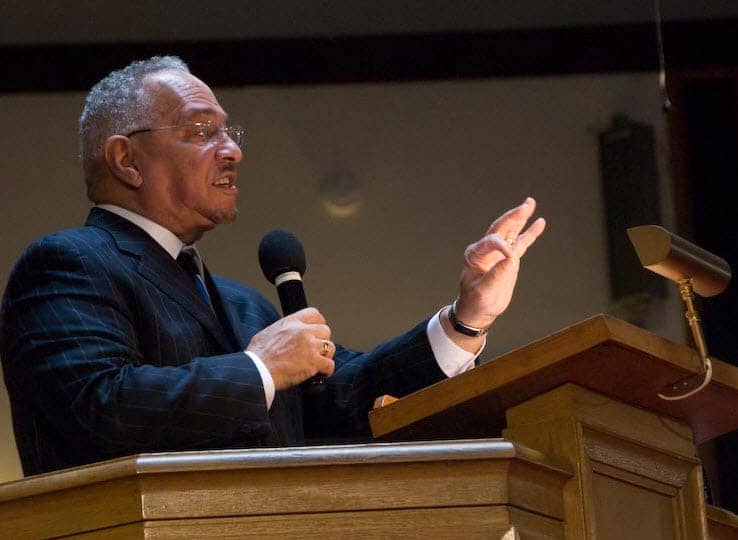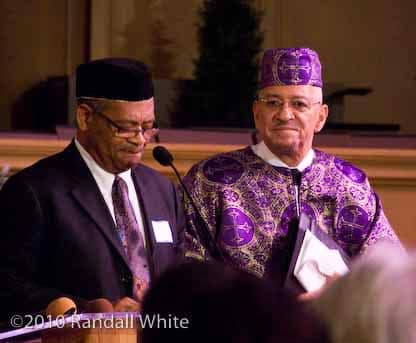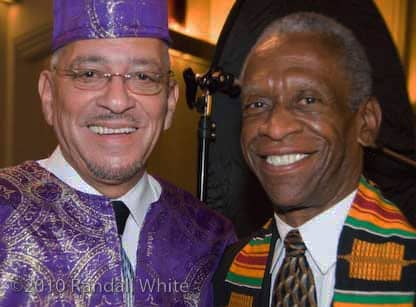by Randall White

“The Haitians had their duly elected, democratically elected president kidnapped by United States Marines.”
On Sunday, Sept. 19, at Allen Temple Baptist Church in Oakland, it soon became obvious that when Rev. Dr. Jeremiah Wright said he had “retired” a couple of years ago, it meant he retired from his daily pastoral obligations at Trinity United Church of Christ (TUCC) in Chicago – where the Rev. Otis Moss III is now the senior pastor – and did not include his prophetic obligation to deliver timely messages to the people of God. Since his “retirement” in 2008, he has been in constant demand – just as in the years before Bill Moyers “admitted” that he was aware of the most prolific minister in his own, largely white denomination – as a revival week preacher for many African-American congregations across the USA.
The large congregation of Allen Temple packed their own church early and left the overflow hall to visitors who “came on time.” A good preacher can mostly “fill” Allen Temple; it takes a great preacher to “pack it.” That would have been a good day’s work for a great preacher but, right after Dr. Wright finished his morning sermon, he was whisked away to San Francisco to pack the equally large Third Baptist Church. We’re sure the Third Baptist crowd would have loved to feed him after the service, but Sunday dinner for Dr. Wright was another packed large church back over the Bay to Oakland where he delivered the keynote address – “Living Up to Our Greatness” – for the inauguration of the African American Leadership Commission (AALC).
At Allen Temple, preaching from the text of Micah 6:1-8, a favorite passage of Liberation Theology leaders, Dr. Wright’s sermon topic was “What Does the Lord Require? To Do Justice?” The text points out that “doing justice” is not just a guideline but a requirement for those who claim to be the people of God. Like Rev. Dr. Jeremiah Wright, the Hebrew prophet Micah was confronting the ruling elite and government of his day demanding that they throw off their oppressive addiction to and desire for power and return to the “justice for all” that was required in the covenant relationship they had with their Creator. One doesn’t have to look hard in the Book of Micah to see that there is a direct correlation to the Haiti of today.
The ruling elite of Israel and Judah wanted to pursue a life of luxury and excess, feeling that their position on the economic food chain entitled them to exploit the workers at will. When the peasants couldn’t keep up with the increased demands of the plutocracy, the rich landowners were able to evict the peasants after bribing the judges or ousting the government officials who didn’t “play along.” The unemployed peasants were forced into the now overcrowded urban areas which saw overwhelming poverty on a scale never before experienced by the Hebrew nation. Micah saw a return to justice and right living as a way back to meeting up to God’s expectations for those who wanted to be known as his people.
While not calling for the return of Aristide to Haiti or for the participation of Lavalas in the upcoming presidential elections, Rev. Wright waded into Haiti’s issues that would be glossed over by the corporate media interests in their pursuit of celebrity gossip:
“We give $498 million for Haiti’s natural resources – for sugar, for timber, for flax seed – and guess what else we give them money for? For their concrete! They send their Grade A concrete to rich countries for pennies on the dollar and are left to build their homes and schools, their hospitals and churches with inferior concrete that cannot withstand any kind of earthquake – much less a 7 point anything on the Richter scale. Why not do justly? Why not ‘do justice’ in Haiti and give a fair price of $5 billion for Haitian exports. That’s what they bring in the white world, after we steal them for pennies from poor Black folk.”
Rev. Wright has been exhorting the African-American church family to stand in solidarity with the oppressed in Haiti for some time. Wright was one of the few national leaders in 2005 to sign a Lavalas petition calling for the return of Aristide and the end of the U.S.-directed occupation. Later the same year TUCC – when Rev. Wright was still pastor – hosted a showing of “Haiti the Untold Story” in Chicago.
In the Allen Temple sermon, the reverend returned to the subject of restitution and reparations – after exposing the injustice in South Africa – by providing further scriptural authority to the issue:

“Zacheus says, in so many words, ‘I cannot get right with God if things are still wrong between me and the people made in God’s image.’ … The white Dutch Afrikaners did not want to hear this part of the reconciliation process … ‘Reparations’ is a dirty word when it comes to the rich and when it comes to the powerful in this country also – not just in South Africa … Zacheus engaged in reparations.”
The dynamics of justice to people of African descent was further explored at the AALC event of interfaith community leaders. The fear of the dominant culture is hard to move. The methodology of the oppressive class depends on restricting transfer of power and wealth to a zero sum game model: One group can only progress if another group loses. In its quest for hegemony, embracing another culture or nation to collective progress is counter to maximizing wealth. Sustainable economic and cultural models are rarely explored and usually disrupted whenever they show promise.
Rev. Wright’s comments on Haiti
Below is the full transcript of Rev. Wright’s comments on Haiti in the sermon: “What Does the Lord Require? To Do Justice?” Here is an audio clip of that part of the sermon, which he delivered Sunday, Sept. 19, 2010, at Allen Temple Baptist Church in Oakland
“Justice for the helpless in Haiti. Haiti was forced by European powers to pay reparations to the French – $21 billion worth of reparations. The first and only time in world history that reparations were imposed by a defeated nation – France – on a nation that had defeated it – Haiti. A racist decision backed and supported by the United States, with U.S. banks being one of the places that poor Blacks in Haiti had to borrow the money, with interest, to pay back rich white folk.
“Justice. Not just prayers for Haiti, but justice for Haiti. Sustained justice for Haiti, on whom the International Monetary Fund and the World Bank keep instituting policies that undermine Haitians’ agricultural base. The recent IMF loan to Haiti required Haitians to stop producing rice. You wanna help Haiti? Pray, yes. Send monetary assistance – not to the Red Cross; they’re still holding on to those millions – yes. But also get on your phone. Get on your email. Get on the case and force Congress to change the policies which keep Haiti poor, keep Haiti colonized and punishing them for daring as Africans to break free of European domination. That’ll help Haiti.
“We give $498 million for Haiti’s natural resources – for sugar, for timber, for flax seed – and guess what else we give them money for? For their concrete! They send their Grade A concrete to rich countries for pennies on the dollar and are left to build their homes and schools, their hospitals and churches with inferior concrete that cannot withstand any kind of earthquake – much less a 7 point anything on the Richter scale. Why not do justly? Why not ‘do justice’ in Haiti and give a fair price of $5 billion for Haitian exports. That’s what they bring in the white world, after we steal them for pennies from poor Black folk.”
“If you want to help Haiti, forgive the debt. Tell your congressmen that. That’s justice. If you want to help Haiti, pay them a fair price for their exports so they can build their own rice fields, build their own houses, build their own schools with Grade A concrete and have their own emergency services.

“The Haitians had their duly elected, democratically elected president kidnapped by United States Marines and flown to the [Central African Republic] on a CIA plane, to get him out of the way of the rich U.S., French and foreign business interests.
“You want to help Haiti? Let’s do justice. Tell the truth, be honest, fess up, pay up and in addition to charity, let’s give Haitians dignity. Stop the double standard of letting white skinned Cubans in [as immigrants to the U.S.] and keeping black skinned Haitians out. God demands justice. God desires justice. And God requires justice.”
Randall White, a leading member of the Haiti Action Committee, can be reached at raw@haitiaction.org. This story originally appeared at http://haitiaction.net/News/RAW/9_21_10/9_21_10.html.





